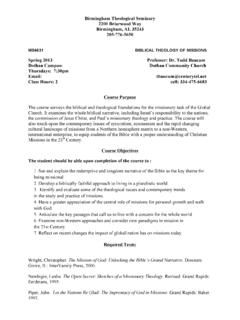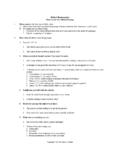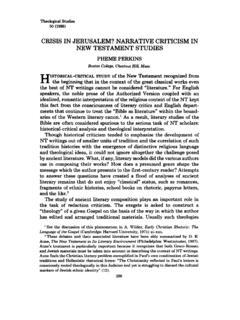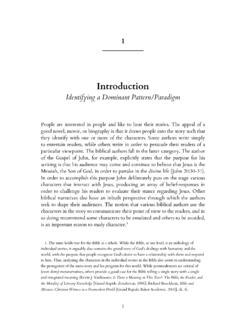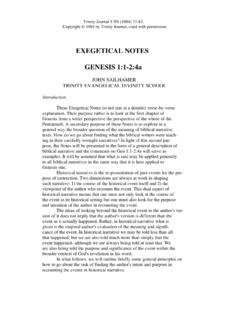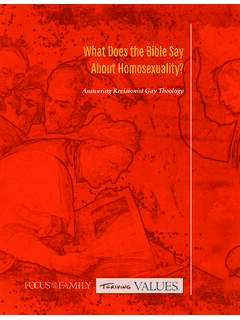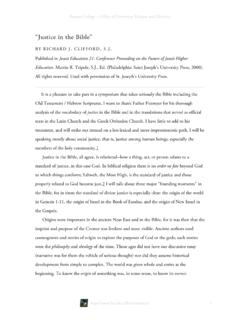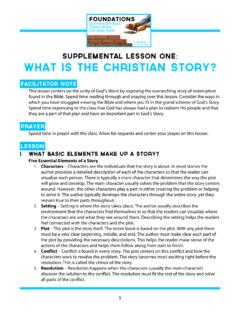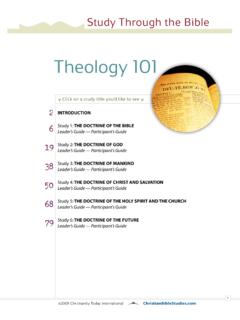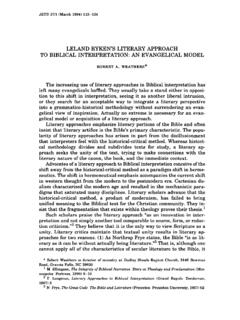Transcription of (2005): 229-45 OF OLD TESTAMENT NARRATIVE: …
1 WTJ67 (2005): 229-45 EXAMINING THE NARRATIVES OF OLD TESTAMENT narrative : an exploration in biblical THEOLOGY PAUL R. HOUSE For many years now experts have been discussing ways that narrative ap-proaches to theology may help postmodern readers understand the Bible in fresh In the fields of Old TESTAMENT Theology and biblical Theology (which I define as treatments of the whole of scripture instead of one TESTAMENT or the other) several recent volumes utilize techniques associated with narrative studies to make theological statements. For example, Stephen Dempster and John Goldingay use literary criticism such as that advocated by Robert Alter and others in their treatments of the wholeness of the Old Craig Bartho-lomew and Michael Goheen do the same in their analysis of the whole " biblical Story," as do C.
2 Marvin Pate, J. Scott Duvall, and the other authors of The Story of Israel: A biblical Theology? Though some scholars may sever historical and lit-erary concerns, V Phillips Long has argued correctly that some of the types of criticism employed by literary critics can be applied to Old TESTAMENT narratives and to other historically accurate texts without impugning those texts' accuracy or Long's work is very important at this point, since evangelicals should be wary of methods that do not take biblical inspiration into account. Carl Henry was right to make this point in his 1985 dialogue with Hans PmdR. Home Associate Dean and Professor of Divinity at Beeson Divinity School, SamfordUnivernty in Birming-ham, Ah.
3 An earlier form of this article was presented at the eastern regional meeting of the Evangelical Tlieologju:al Society, Calvary Church, Souderton, Pa., 1 April 2005. 1 See, , Gabriel Fackre, " narrative Theology: An Overview," Int 37 (October 1983): 340-52 and the other articles in that issue. See also George A. Lindbeck, The Nature of Doctrine: Religion and Theology in a Postliberal Age (Philadelphia: Westminster Press, 1984); and Hans Frei, The Eclipse of Bib-lical narrative (New Haven: Yale University Press, 1974). 2 Stephen Dempster, Dominion and Dynasty: A Theology of the Hebrew Bible (New Studies in biblical Theology; Downers Grove: InterVarsity Press, 2003); and John Goldingay, Old TESTAMENT Theology: Vol.
4 1, Israel's Gospel (Downers Grove: InterVarsity Press, 2003). 3 Craig G. Bartholomew and Michael Goheen, The Drama of Scripture: Finding Our Place in the biblical Story (Grand Rapids: Baker, 2004); and C. Marvin Pate et al., The Story of Israel: A biblical Theology (Downers Grove: InterVarsity Press, 2004). 4 V Phillips Long, The Art of biblical History (Foundations for Contemporary Interpretation 5; Grand Rapids: Zondervan, 1994); and "Historiography of the Old TESTAMENT ," in The Face of Old TESTAMENT Studies: A Survey of Contemporary Approaches (ed. David W. Baker and Bill T. Arnold; Grand Rapids: Baker, 1999), 145-75.
5 5 Carl F. H. Henry, Gods of This Age God of the Ages (Nashville: Broadman Press, 1994), 257-76. 229 230 WESTMINSTER THEOLOGICAL JOURNAL Long's assertion has support in other disciplines. Indeed, no less prominent historian than George Marsden states in his 2003 biography of Jonathan Edwards that historians need to tell their subject's story in an interesting way: The first goal of a biographer, it seems to me, should be to tell a good story that illu minates not only the subject, but also the landscapes surrounding that person and the horizons of the readers. Unlike specialized studies that analyze every intellectual issue and historical debate, much of the illumination should come simply from the telling of a story.
6 That story should reveal a real person whose successes were achieved in the midst of anxieties, weaknesses, and failings. The tensions of a life are often what cast most light, not only on the person but also on the culture and the wider human expe It seems, then, that there may be a growing interest across disciplinary lines in utilizing literary analysis of narrative in a way that links traditional literary, his torical, and theological aims. For the most part, I find these trends promising. I have described my own methodological foundational principles and convic tions in other places, so I will not repeat them in detail Rather, I will simply state that I am a traditional evangelical in my historical conclusions and in my beliefs about the inspiration and authority of scripture.
7 Also, I believe in the unity of the Bible, adhere to a canonical approach, try to utilize a literary approach best represented by the work of Gleanth Brooks,8 and strive to mesh exegesis and theological reflection. I believe in narrative theology in the sense that I am con vinced that narrative analysis yields theological data that involves readers in the biblical story in a unique and telling way. To be more specific, how the Bible itself depicts God, Israel, and other primary characters through statements, settings, and events can lead interpreters to legitimate and accurate theological com ments that come from the text itself.
8 I make this statement about "the Bible itself" because many scholars believe that the most basic of all principles in biblical Theology is the notion that cate gories for theological reflection ought to come from the Bible itself, not from external sources. Though it is questionable as to whether interpreters can ever completely achieve this goal, the effort is worthy if the Bible is to be heard on its own terms and if biblical Theology is to be the sort of helpful "bridge disci pline" C. R. Scobie and others hope it will b George Marsden, Jonathan Edwards: A Life (New Haven: Yale University Press, 2003), 10.
9 7 For my approach to Old TESTAMENT Theology as a subset of biblical Theology see Old TESTAMENT T/teology (Downers Grove: InterVarsity Press, 1998), 11 -57; for my approach to biblical Theology see " biblical Theology and the Wholeness of Scripture: Steps Toward a Program for the Future," in biblical Theology: Retrospeit and Prospect (ed. Scott J. Hafemann; Downers Grove: InterVarsity Press, 2002), 267-79; and for my approach to literary criticism see "Literary Criticism, Old TESTAMENT Liter ary Criticism, and the Wholeness of Scripture," in The Task of 7heology for the Chun h in the 21st Century (ed.. Kim; Proceedings of the Fourth PGTS International Symposium; Seoul: PGTS Press, 2004), 2-28.
10 8 See esp. his integration of history, text, and reader in Historical Eliderne and t/ie Reading oj Seventeen i-Century Poetry (Columbia: University of Missouri Press, 1991) and in Community, Religion, and Literature (Columbia: University of Missouri Press, 1995). The often-repeated comment that all New Critics rejected historical analysis is simply not accurate. q See C. R. Scobie, lite Ways of Our God (Grand Rapids: Baker, 2003). EXAMINING THE NARRATIVES 231 How can we start to use biblical categories to glean " narrative theology"? One place to begin is with the historical summaries found throughout the Old Testa-ment. After all, scholars as diverse in viewpoint as Gerhard von Rad and Graeme Goldsworthy have argued that within the Bible itself there reside crucial specific summaries of the story of Israel and the human race to that point in the These summaries include many of the same elements, yet also emphasize points germane to each new resting point in the narrative .
